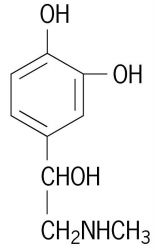Epinephrine
A hormone which is the predominant secretion from the adrenal medulla; also known as adrenalin, it has the structure shown. Epinephrine is a sympathomimetic substance; that is, it acts on tissue supplied by sympathetic nerves, and generally the effects of its action are the same as those of other nerve stimuli. Conversely, the stimulation of the splanchnic or visceral nerves will cause the rapid release of the hormone from the medullary cells of the adrenal gland. Thus, epinephrine plays an important role in preparing the organism to meet conditions of physiologic emergency.
When injected intravenously, epinephrine causes an immediate and pronounced elevation in blood pressure, which is due to the coincident stimulation of the action of the heart and the constriction of peripheral blood vessels. The chief metabolic changes following the injection of epinephrine are a rise in the basal metabolic rate and an increase of blood sugar. These effects of epinephrine are transitory. See Adrenal gland, Carbohydrate metabolism
